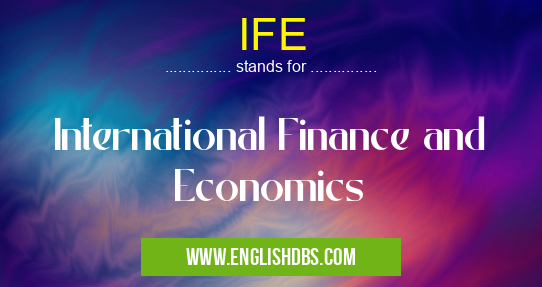What does IFE mean in INTERNATIONAL
International Finance and Economics (IFE) is an interdisciplinary field that combines economics, finance and international business. It deals with the economic problems faced by countries on an international level and seeks to identify solutions that can help foster global economic stability. IFE looks closely at how different countries interact and examines how these interactions may affect trade, investment, currency movements and government policies.

IFE meaning in International in International
IFE mostly used in an acronym International in Category International that means International Finance and Economics
Shorthand: IFE,
Full Form: International Finance and Economics
For more information of "International Finance and Economics", see the section below.
Essential Questions and Answers on International Finance and Economics in "INTERNATIONAL»INTERNATIONAL"
What is International Finance and Economics?
International Finance and Economics (IFE) is an interdisciplinary field that combines economics, finance, and international business. It deals with the economic problems faced by countries on an international level and seeks to identify solutions that can help foster global economic stability.
What are some of the topics examined in IFE?
IFE looks closely at how different countries interact and examines how these interactions may affect trade, investment, currency movements and government policies. Additionally, it studies macroeconomic trends such as inflation rates, exchange rates, unemployment levels, market efficiency measures, federal budget deficits or surpluses, productivity growth rates and consumer price indices.
What type of professionals typically work in IFE?
Professionals working in the field of IFE include economists, financial analysts, bankers, investors, consultants and government officials. These professionals use their knowledge of economics theory and analysis to help evaluate market conditions across different countries. They also create strategies for public policy decisions aimed at combating challenges related to global markets or managing a country's economy more effectively.
How important is IFE in today's world?
IFE has become increasingly important as economies around the world become more interconnected through technological advances such as online banking platforms or cross-border investments. With globalization has come great complexity to our global financial system; understanding this complexity requires deep expertise in areas like macroeconomics or international monetary policy—knowledge provided by professionals trained in the field of IFE.
What degree do you need to work in IFE?
Professionals who want to pursue a career in IFE often have advanced degrees like master's or doctorate degrees from universities with strong programs in economics or finance. However there are many different job opportunities available for those looking for entry-level positions who have bachelor's degrees from accredited universities focusing on economics or related fields such as business management or accounting.
Final Words:
International Finance and Economics (IFE) offers a variety of opportunities for qualified professionals to analyze market conditions across different countries while pursuing potential solutions to global economic issues. Knowledge of both economics theory plus a mastery of its practical applications is essential for success within this vibrant field.
